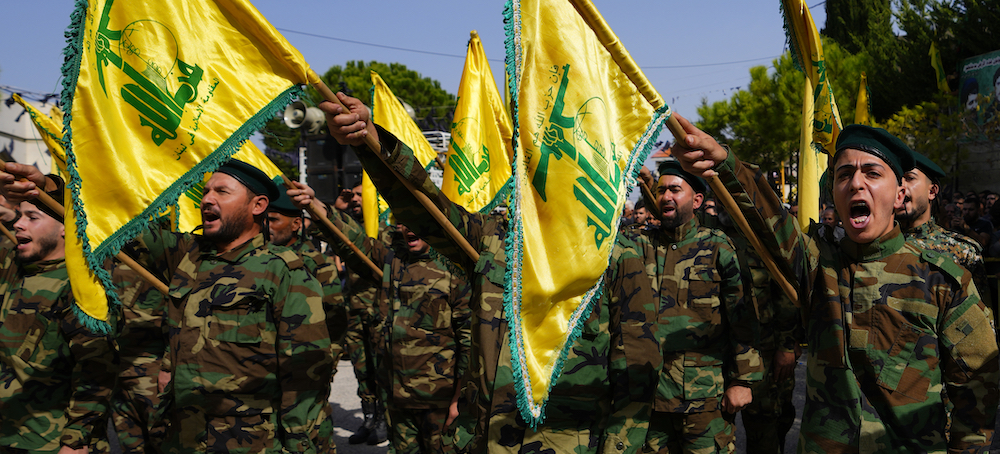The Big War No One Wants in the Middle East
Kim Ghattas The Atlantic Hezbollah fighters. (photo: Hassan Ammar/AP)
Hezbollah fighters. (photo: Hassan Ammar/AP)
At some point, stepping back from this brink will become impossible.
Hezbollah is usually quick to claim credit for its attacks. Over the past few months, the group has repeatedly aimed volleys of Katyusha rockets at Israeli-army positions in the Golan and announced that it has done so. Also on Saturday evening, Hezbollah took credit for rockets that hit the headquarters of an elite Israeli mountain brigade in the Golan.
But this strike is different. Both sides had been avoiding attacks that could cause large loss of life and a regional conflagration. What’s more, Hezbollah had been trying to repair frayed ties with the Druze community not only in Lebanon but in Syria, where for years the Lebanese group has been involved on President Bashar al-Assad’s side of a bloody civil war.
Yet 12 children and teenagers are dead, and the Druze community is deeply distraught. Some irate residents have said that Israel will not avenge the dead because they were Arab and Druze rather than Jewish. Israeli Prime Minister Benjamin Netanyahu received an angry welcome when he visited the town today. Israel seized the Golan Heights from Syria in 1967, and effectively annexed the territory in 1981. In 2019, the United States became the first nation to recognize Israeli sovereignty over the area, which the rest of the international community continues to regard as occupied territory. Although the Druze elsewhere in Israel serve in the army, most of those in the Golan Heights refused Israeli citizenship and have residency cards. None of those killed was an Israeli citizen.
Now Lebanon is bracing for the worst and the Middle East is on the brink of regional war. However, despite the calls by some Israeli politicians to “tear Beirut apart,” and Netanyahu’s promise that Hezbollah will pay an unprecedented price, no one really wants this to be the big one. As I argued earlier this month, a full-scale war between Israel and Hezbollah would achieve nothing other than devastation. It could also involve Iran, Hezbollah’s patron and Israel’s nemesis, and drag in the United States.
Rather, a slow-motion, coordinated response is now unfolding as American and regional diplomats scramble to, if not avert, at least manage and limit the escalation—much the way the Biden administration and other relevant parties worked to choreograph the Iran-Israel back-and-forth of drones and missiles in April, telegraphing intentions to avoid miscalculation and reduce the margin of error.
Netanyahu was in Washington, D.C., when the Majdel Shams attack happened; he held a security-cabinet meeting upon his return, almost a day later. This has somewhat slowed down the churn of the Israeli military machine, which has acted more swiftly in the past. In 2006, for example, when Hezbollah kidnapped Israeli soldiers, Israeli air raids over southern Lebanon started almost immediately and hit the Lebanese international airport within 24 hours.
Secretary of State Antony Blinken has made clear that the United States does not want the conflict to escalate. But Israel will retaliate, and Hezbollah knows it. The group has reportedly begun evacuating some of its positions in southern Lebanon and the eastern Bekaa Valley. Reports also suggest that pro-Iran militias in Syria are on the move in anticipation of Israeli strikes.
Israel will very likely step up attacks on Hezbollah in Lebanon and Syria, and it may even take aim at some Lebanese infrastructure. But Washington will almost certainly advise Israel to choose its targets carefully and avoid population centers, especially Beirut. The United States will also likely warn Hezbollah to restrain its response to the Israeli strikes in order to avoid escalation. Just as in April, the Biden administration could then counsel Israel to take the win.
As fraught as this moment surely is, one element is favorable: Assad, long a pariah for his bloody repression of Syria’s civil uprising, is completely missing in action and has been throughout the war in Gaza. The Assad regime has historically been a vocal champion of the Palestinian cause, a supporter of Hezbollah, and an ally of Iran in the so-called Axis of Resistance against Israel. But Israel has been striking Iranian and Hezbollah assets in Syria with nary a response, probably because Assad seeks to mend ties with countries in Europe and the Persian Gulf and does not want to jeopardize that effort by showing up for this battle.
But the moment’s dangers emanate from other directions. Hezbollah could misread Israeli military movements and, fearing a ground invasion, take preemptive action. Israeli strikes could overreach, killing scores of civilians or hitting targets that Hezbollah considers outside the rules of engagement. Much will depend on maintaining open channels of communication among all the interested parties, including Iran.
This tragedy should focus the mind: How many more times can the region approach the brink in this manner before stepping back becomes impossible? Only with a cease-fire in Gaza and a hostage deal can the Lebanon-Israel border also begin to be defused. The United States insists that the onus is on Hamas to accept a deal, but Netanyahu has repeatedly added new conditions and hardened his position. President Joe Biden should apply all the pressure he can to conclude this negotiation, now that he’s unburdened by the constraints of a reelection campaign—both to spare the region from more war and destruction and to seal his foreign-policy legacy.



